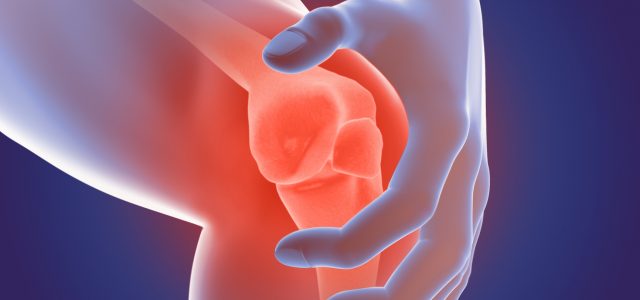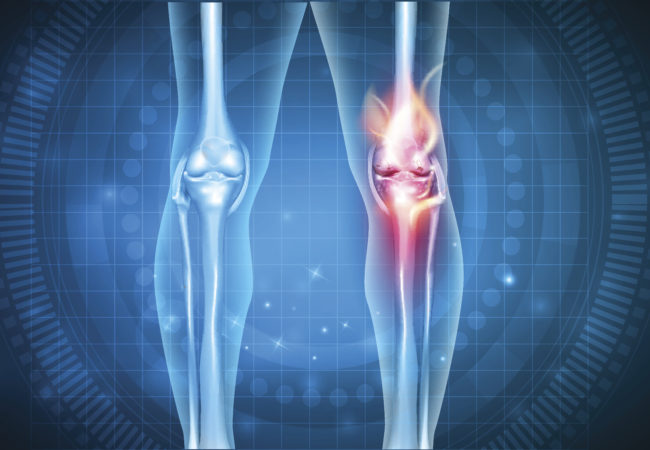Everything You Need To Know About Treating Arthritis Pain
Lifestyle November 4, 2023 Hannah Lamarque


Joint problems bright abstract design, burning damaged knee
Difficulty moving? Not feeling like you can ever move like your old self again? Thinking the good old days of moving freely are gone? Before you say yes to all, Think again. This is one thing doctors don’t and won’t tell you because the treatment is so new. It’s one thing that can change your life with Arthritis forever. Before we talk about that, Let’s discuss what are we even talking about. Arthritis threatens daily mobility and independence. This chronic and debilitating illness affects 27 million Americans and leads to permanent damage in joints. This is the real reason why your friends over 50 say it’s hard to get out of the bed sometimes. The medical reason is that Arthritis makes cartilage thin and causes fluid to leak into the joint lining leading into more pain and swelling. If this goes unchecked there can be a lot of damage done to the joints. The most common kind of arthritis is rheumatoid arthritis, which can affect the whole body and cause great pain. Every senior is at risk of developing rheumatoid arthritis. It’s a disease that gets more common with age, and symptoms can strike out of nowhere. Lucky there are a lot of rheumatoid arthritis treatments available that can help drastically reduce the symptoms and slow down the disease. That way you are fully prepared to enjoy your life arthritis symptoms free!
Rheumatoid arthritis (RA) is an autoimmune disease in which the body’s immune system – which normally protects its health by attacking foreign substances like bacteria and viruses – mistakenly attacks the joints. This creates inflammation that causes the tissue that lines the inside of joints (the synovium) to thicken, resulting in swelling and pain in and around the joints. The synovium makes a fluid that lubricates joints and helps them move smoothly.
About 27 million people in the United States have rheumatoid arthritis (RA). Nearly three times as many women have the disease as men. In women, RA most commonly begins between ages 30 and 60.
In the early stages, people with RA may not initially see redness or swelling in the joints, but they may experience tenderness and pain.
These following joint symptoms are clues to RA:
Joint pain, tenderness, swelling or stiffness for six weeks or longer
– Morning stiffness for 30 minutes or longer
– More than one joint is affected
– Small joints (wrists, certain joints of the hands and feet) are affected
– The same joints on both sides of the body are affected
– Along with pain, many people experience fatigue, loss of appetite and a low-grade fever.
Typically, rheumatoid arthritis starts in one area of the body, then expands into other areas over time. RA is progressive, which means it worsens over time if it’s left untreated.
If you’re wondering how to spot the symptoms of RA, you’ll want to look for morning joint stiffness. This stiffness can be relieved with muscle movements — essentially, the pain can disappear once you start moving. Over time, RA symptoms worsen as joint damage occurs, like tendon erosion and reduced range of motion.
The goals of rheumatoid arthritis (RA) treatment are to:
Stop inflammation (put the disease in remission)
– Relieve symptoms
– Prevent joint and organ damage
– Improve physical function and overall well-being
– Reduce long-term complications
– To meet these goals, the doctor will follow these strategies:
Medication is one of the most popular treatment options. There are different drugs used in the treatment of rheumatoid arthritis. Some are used primarily to ease the symptoms of RA; others are used to slow or stop the course of the disease and to inhibit structural damage:
Nonsteroidal anti-inflammatory drugs (NSAIDs): Available both over-the-counter and by prescription, NSAIDs can help RA pain and inflammation. They can also reduce joint swelling.
Corticosteroids: These anti-inflammatory medications are fast-acting, and they can control inflammation and pain,
Disease-modifying anti-rheumatic drugs (DMARDS): These medications try to modify RA itself, slowing down the disease’s progression. They’re available as pills, infusions, and injections.
Biologics: Similar to DMARDs, biologics are fast-acting prescription medications that specifically target inflammation. These medications can slow down, modify, or stop RA.
You can live a healthy, happy life if you speak with your doctor about a tailored approach to treating your specific symptoms. Many people who have rheumatoid arthritis rely on a combination of different treatment options to improve their quality of life. Since rheumatoid arthritis can get progressively worse, it’s important to contact your doctor and get a diagnosis. This will ensure you start treatment as quickly as possible.
Stretching and Exercise
For people with RA, exercise is so beneficial it’s considered the main part of RA treatment. The exercise program should emphasize low-impact aerobics, muscle strengthening, and flexibility.
Hot and Cold
Heat treatments, such as heat pads or warm baths, tend to work best for soothing stiff joints and tired muscles. Cold is best for acute pain. It can numb painful areas and reduce inflammation.
In order to maintain your health, you’ll want to be informed about the latest rheumatoid arthritis treatments. As increasingly more advances occur, you may be able to better manage your symptoms. Make sure you stay informed and talk to your doctor about the latest available medications, treatment options, and pain management methods. Being knowledgeable can reduce your pain and help you stay active, even with RA.
Related Topics (Ads):
Citations
– https://curearthritis.org/breakthrough-osteoarthritis-molecule/
– https://www.leicestermercury.co.uk/news/health/arthritis-breakthrough-cure-1202389